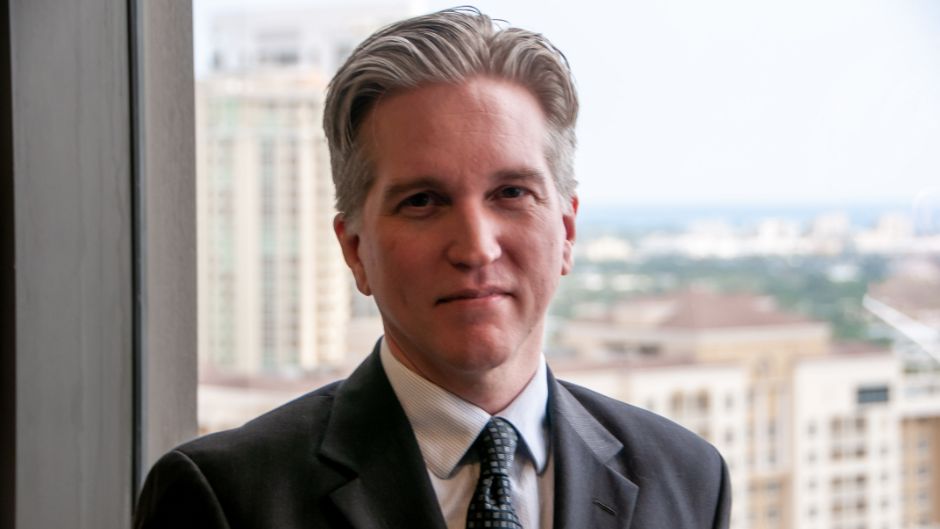Justin Griffis, J.D. ’02, is the chief of the Broward County State Attorney’s Office Cybercrime Unit. A prosecutor of over 20 years, he stays at the forefront of criminal law and emerging technologies, frequently dealing with unresolved constitutional issues. From the cloud to social media, cell phones to smart homes, the nature of criminal prosecution has changed dramatically in just the past decade. As more crimes now involve technology, he helps bring this critical change into focus for both his colleagues and the people of Florida.
Griffis began his career as a line prosecutor before being promoted to supervisor in the Sexual Battery and Child Abuse unit. His work there led to him becoming one of the first dedicated Human Trafficking prosecutors in Broward, a crime heavily revolved around modern technology. A member of the Internet Crimes Against Children task force and various counter-terrorism units, his role in the prosecution of the Parkland school mass shooter ultimately led to the creation of the Cybercrime Unit, which he now leads.
Cybercrime prosecutions involve a variety of crimes and platforms: from revenge porn to exploitation of minors to threats to carry out terroristic acts. And the technologies are often just as varied in an area where the law frequently tries to catch up. Knowing how to retrieve and exhibit evidence locked away in a smartphone, how to interpret location data from a phone company, or retrieving financial information from a blockchain is vital. The cases are technically tricky and frequently require a balancing act of properly investigating crimes while not running over privacy rights.
Griffis regularly lectures for the Florida Prosecuting Attorneys Association, National District Attorneys Association, Broward College Institute of Public Safety, and various police departments on cybercrime, search warrants, child abuse, trial strategy, sexual assault investigations, and the use of technology in criminal investigations. He has also recently become a published author on some of these topics. He regularly serves as a public speaker to parents and children about the potential dangers of social media.
Your undergraduate degree is in business and finance. Why did you decide to go to law school?
I actually started out (briefly) in the engineering school, thinking I would end up pursuing a career in a science-related field. And like many students, I found myself bouncing between areas of study and trying to find myself and a career path. But nothing felt right. So as graduation loomed, I decided to take some pre-law classes, which I ended up enjoying more than I anticipated.
Did you come to Miami Law with a determined path, or did something change your trajectory?
I’ve frequently joked that I have a real passion for music but no talent. With my background, I thought I might get into entertainment law and management. During my time at UM Law, I was given some very solid advice: do the litigation skills program and an internship “somewhere” where I’d be in a courtroom speaking on the record and arguing cases. “You need to know if it’s something you can handle.” I ended up interning with the State Attorney’s Office and fell in love with what would end up becoming my career.
You didn’t set out to be a prosecutor. What are some of the aspects that surprised you?
Besides the obvious that it’s not like on TV, I’ve always been appreciative of the fact that there’s an opportunity to do the right thing from the outset. And the job is much broader than just crime and punishment and bringing justice to victims. There’s public outreach to help educate the community on various aspects to be a leader in your community. There’s also a real sense of camaraderie with my colleagues, something I’ve learned just isn’t as prevalent in the private sector. The people I work with are also my friends, and even after some have left the office, our relationships have endured.
I’ve been both a mentee to a brilliant attorney, which allowed me to pursue one of my original interests (engineering and science) that has shaped what I do today, and now I get to be a mentor in turn. This also means that I’ve become something of a teacher, educating both law enforcement and prosecutors – a role I thoroughly enjoy and never would have suspected would have been a part of my job. To say that I truly enjoy my job would be an understatement.

